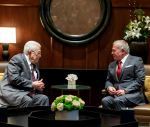You are here
Experts discuss impact of tourism on sustainable development
By Fares Al Abed - Nov 13,2017 - Last updated at Nov 13,2017

A two-day regional conference titled ‘Tourism in the Middle East and North Africa [MENA]: Competitiveness for Sustainable Growth’ kicked off on Monday with a focus on the relation between tourism and sustainable growth (Photo by Fares Al Abed)
AMMAN — The relationship between tourism and sustainable growth was the focus of a regional conference that began in Amman on Monday.
Titled “Tourism in the Middle East and North Africa [MENA]: Competitiveness for Sustainable Growth”, the two-day meeting aims at developing sustainable urban tourism in the region.
Deputising for Prime Minister Hani Mulki, Tourism Minister Lina Annab said: “We are gathered to discuss the global trend of urbanisation and its impact on cities and tourism and their competitiveness for sustainable growth.”
The conference comes as part of the activities of the 2017 International Year of Sustainable Tourism to reflect the Global Sustainable Development Goals 2030, according to the organisers.
The first day of the event saw the attendance of Amman Mayor Yousef Shawarbeh, World Tourism Organisation (UNWTO) Secretary General Taleb Rifai, officials and experts in the field, in addition to businesspeople from the sector.
“Today, over 55 per cent of the world population live in cities, and this growth is accelerating. As we become more urban, the importance of cities will undoubtedly increase,” Annab noted.
“As we look at developing tourism in our cities, mainly Amman, in a competitive and sustainable way, we should ensure that this is not done in isolation, and that this development is part of a wider community connected through viable infrastructure and effective transport links,” she added.
She stressed that “the more citizens feel engaged with their city, the more they feel collectively responsible for it.”
The two-day conference aims at ensuring integration of policymaking, legislative frameworks and effective management among all stakeholders in developing sustainable urban tourism in the MENA region cities, according to an organisers’ statement.
It also aims at improving transparency, knowledge, accessibility, expertise and creativity as essential tools to compete in the era of knowledge economy in different parts of the region, the statement said.
Shawarbeh highlighted tourism as a pillar for economic growth in the cities within a comprehensive approach.
“We look forward to increasing the numbers of tourists in the cities of the Middle East in the upcoming years, and we value our extensive partnership with the Tourism Ministry, the private sector and the civil society institutions in this field, as they have helped us develop touristic sites in Amman, like the Hashemite Square in downtown,” the mayor said.
For his part, UNWTO secretary general said: “Travel and tourism have become a global force and a cornerstone of major transformations.”
He noted that travel and tourism have also become integral parts of major global challenges including climate change, migration, employment, safety and security, among others.
“In 2016, there were 1,235 million travellers who crossed international borders,” Rifai said, adding “that is almost one sixth of the world population going on an international trip every year. While doing so, they are bringing tremendous benefits to communities, economies and societies.”
“Travel and tourism are the third largest exporting industry in the world after chemicals and fuels,” he said, noting that UNWTO’s long-term forecasts show that there will be 1.8 billion international travellers by the year 2030.
Related Articles
AMMAN — Tourism Minister Lina Annab on Wednesday announced that the first regional conference on “Tourism in the Middle East and North Afric
AMMAN — Tourism Minister Lina Annab on Sunday announced that Amman will host the first regional conference on tourism in MENA cities, held u
AMMAN — The Ammon Applied University College (AAUC) on Tuesday renewed the Tourism Education Quality certificate (TedQual) for its bachelor

















